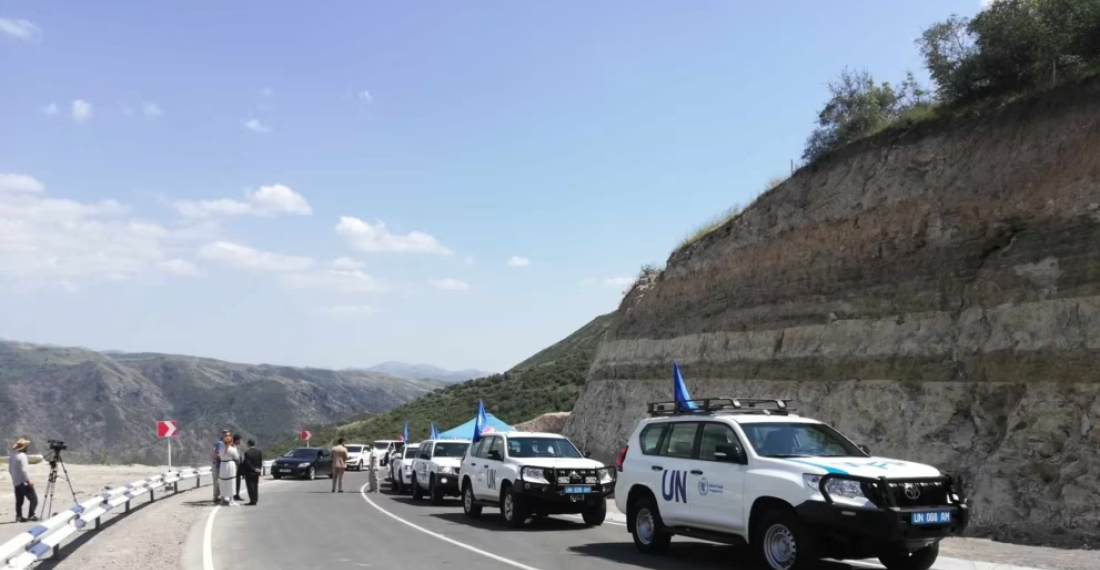A group of human rights experts from the United Nations have joined growing international calls on Azerbaijan to fully re-open the Lachin Corridor connecting Armenia to Nagorno-Karabakh amid fears of a growing humanitarian crisis in the region.
Movement in and out of Nagorno-Karabakh along the Lachin Corridor has, in one form or another, been hindered by Azerbaijan since December 2022 in what has been widely characterised as a blockade, although Baku rejects this allegation.
A statement published on Monday (7 August) on the website of the Office of the United Nations High Commissioner for Human Rights said that "the blockade, obstructing the sole road connecting Nagorno-Karabakh to Armenia for the past seven months, has left the population facing acute shortages of food staples, medication, and hygiene products, impacted the functioning of medical and educational institutions, and placed the lives of the residents – especially children, persons with disabilities, older persons, pregnant women, and the sick – at significant risk."
"The blockade of the Lachin Corridor is a humanitarian emergency that has created severe shortages of essential food staples including sunflower oil, fish, chicken, dairy products, cereal, sugar and baby formula," the experts said. They warned that the region was rapidly depleting its medical reserves, and hospitals were struggling to provide care as the operation of ambulances has been hampered due to declining fuel supplies, according to the statement.
The statement continued, "the experts urged authorities in Azerbaijan to immediately restore the free and secure movement of persons, vehicles, and cargo moving along the Lachin corridor in both directions, in accordance with the ceasefire agreement of November 2020."
"They also called on Russian peacekeeping forces deployed in the region, to protect the corridor under the terms of the ceasefire agreement."
"By lifting the blockade, the authorities can alleviate the suffering of thousands of people in Nagorno-Karabakh and allow for the unimpeded flow of humanitarian assistance to the civilian population,” the experts said. “It is essential to ensure the safety, dignity, and well-being of all individuals during this critical time," they said.
"We urge the Government of Azerbaijan to uphold its international obligations to respect and protect human rights, including the right to food, health, education and life. We also emphasise the importance of cooperation and dialogue among all parties involved to find a peaceful and sustainable resolution to the Nagorno-Karabakh conflict," the experts said.
Azerbaijan reacts, calls UN statement "worrying" and "biased"
In response to the statement from the UNHCR, the Azerbaijani Foreign Ministry said that their claims were "regrettable" and amounted to attempts to "turn UN bodies into a tool for political manipulations".
"UN special rapporteurs and experts getting deceived by the manipulations of Armenia and issuing biased statements all the while turning a blind eye to the 30 years of occupation of the territories of Azerbaijan, the human rights violations against almost 1 million refugees and internally displaced persons, the presense of Armenian armed forces in the territories of Azerbaijan in the last three years, as well as obstruction of the return of IDPs to their homes is extremely worrying," the Foreign Ministry said.
"Furthermore, the usage by the persons in question of expressions such as “Nagorno-Karabakh” in clear disrespect of the territorial integrity and sovereignty of Azerbaijan, the interference in the internal affairs of Azerbaijan, as well as the double standards against it in the statement are unacceptable."
International calls to re-open Lachin Corridor
Numerous international organisations and countries have in the past weeks and months called on Azerbaijan to restore unrestricted movement along the Lachin Corridor.
These include the European Union, the United States, Russia, Armenia, and the International Court of Justice in The Hague.



